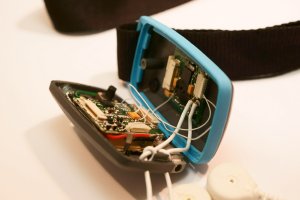IMEC, a world-leading independent research center in nanoelectronics and nanotechnology, and its research affiliate Holst Centre today present a prototype of an electrocardiogram or ECG necklace at the IEEE Engineering in Medicine + Biology Conference (EMBC) in Minneapolis, Minnesota (USA). The technology enables long-term monitoring of cardiac performance and allows patients to remain ambulatory and continue their routine daily activities while under observation. The embedded beat detection algorithm copes with the artefacts inherent to ambulatory monitoring systems.
 Detail of IMEC's ECG necklace developed at Holst Centre
Detail of IMEC's ECG necklace developed at Holst Centre
The ECG necklace is easy to use and characterized by a low power consumption ensuring 7 days autonomy. It contains IMEC’s proprietary ultra-low power analog readout ASIC (application-specific integrated circuit), and relies on a low power commercial radio/microprocessor platform. A wavelet-based heart beat detection algorithm is embedded in the processor that ensures the accurate computation of the instantaneous heart rate, even under high level of noise. A second ultra-low power microcontroller unit controls the wireless transmission of the ECG data to a computer within a range of 10m. An optional memory module enables data logging for applications in which the receiving computer is not in the neighborhood.
Ambulatory cardiac monitoring systems today suffer from inaccurate measurements due to artefacts which are inherent to ambulatory situations. IMEC’s embedded beat detection algorithm has been optimized for robust heart beat detection. It copes with baseline wander, EMG (electromyogram) and motion artefacts, and high and variable electrode impedance. Heart beat is detected with 1 sample resolution. The algorithm achieves best-in-class performances, with 99.8% sensitivity and 99.77% positive predictivity on both the MIT-BIH database and a proprietary database of ambulatory ECG recordings. A satisfactory performance is achieved until 0dB SNR (signal to noise ratio).
With the Human++ program, IMEC and Holst Centre aim to leverage their expertise in nanoelectronics and nanotechnology to develop solutions for a more efficient and better healthcare. IMEC’s generic technology for wireless ECG systems, such as the new ECG necklace prototype, can be used for permanent screening of people at risk of cardiovascular disorders, heart beat and beat analysis information for fit & healthy people and therapy compliance and follow-up for people under cardiovascular treatment. Industry can get access to the technology by joining the Human++ program as research partner or by licensing agreements for further product development.
Posted September 2ndt, 2009